“Probiotics” is a health food buzzword that’s been around since those yogurt commercials in the 2000s. But do probiotics work? And exactly what do probiotics do?
Probiotics mimic the microbial flora that exists inside our intestines. Essentially, they keep our digestion in balance.
Adding probiotics to our diets keeps our bodies functioning smoothly, to process food, and eliminate waste better. But why take probiotics? The answer is simple: If you’ve got a case of the runs, take a probiotic; or if you’re constipated, still take a probiotic!
We are here to help you figure out the science behind the questions, “Do probiotics work?” and “Why take probiotics?”, as well as, “What are the benefits of fermented foods?” We’ll help you understand how probiotics work and why you should take them. We’ll also tell you how to take them when your body isn’t functioning up to par. And, we’ll help you decide how to take them when you have a chronic illness in your intestinal tract.
Finally, we’ll show you ways to make probiotic-rich drinks and how to ferment foods at home so you can incorporate probiotics into your diet naturally. Are you ready? Let’s begin to answer all of your questions.
What are probiotics?
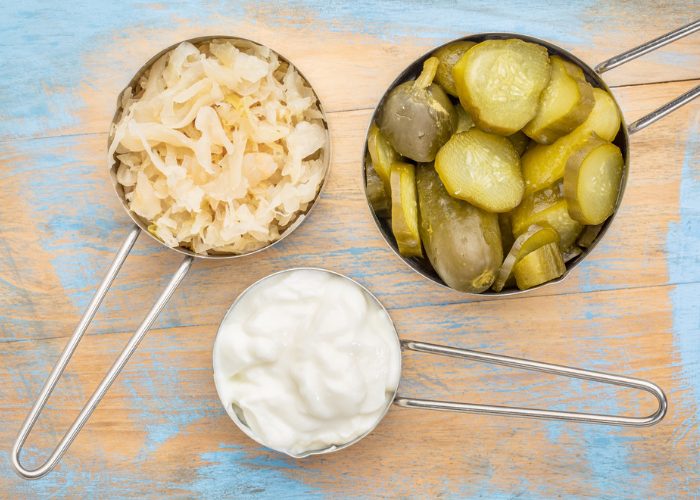
Before leaping into do probiotics work, let’s figure out what they are. Probiotics mimic our bodies’ own natural flora that lives inside our intestines. These flora, which numbers in the millions, are necessary for our intestines to function: to extract and disperse nutrients and eliminate the rest. These “gut flora” also modulate our immune response.[1] This means that sickness can begin in the intestines if our gut flora doesn’t work to keep our immune function at its responsive best.
This is where probiotics come in. Probiotics mimic our bodies gut flora, or “friendly bacteria.” Probiotics are the same as, or nearly identical to, the gut flora inside our intestines. Probiotics keep our innards happy and, well, friendly.
However, when our gut flora isn’t functioning properly, there are very noticeable symptoms. These symptoms most often appear as diarrhea or constipation.
But an imbalance of gut flora can also contribute to a bevy of chronic illnesses. These illnesses include leaky gut syndrome, gastroenteritis, irritable bowel syndrome (IBS), inflammatory bowel disease, fibromyalgia, and others.[2] These ailments occur when there is either not enough gut flora, or when there is an overgrowth of it.
This is when it is a good idea to introduce some additional friendly bacteria in the form of probiotics, to help rebalance our gut flora.
However, just as there are several types of ailments that are caused by an imbalance of gut flora, there are also several types of probiotics to rebalance it. Let’s learn about those, next.
Types of Probiotics
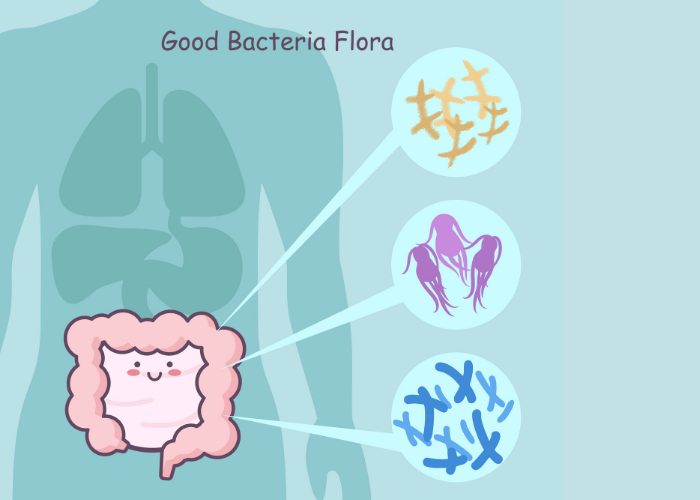
There are more than 500 strains of probiotic bacteria and they each function in different ways within our bodies.[3] Here are just a few of the most common strains, and their ways to keep our bodies running normally.
It’s important to note that each of these strains is just the most basic strain. Each one has several more individual and particular types of cultures. As such, these are the three primary strains that you will see in most of your probiotic products.[4]
- Lactobacillus acidophilus (L. acidophilus): found in fermented foods and yogurt. It helps support vaginal health, reduces diarrhea, calms inflammation and provides GI support.
- Bifidobacterium: found in some dairy products. It helps fight constipation, IBS symptoms, and builds your GI tract immunity.
- Saccharomyces boulardii: an antibiotic-resistant yeast found in probiotics. It helps regulate candida overgrowth.[5]
But do probiotics work? Do they work just via the food we eat? Can eating yogurt really help get rid of constipation, diarrhea, or a yeast infection? Again, the short answer is yes. Read on to find out why probiotics work.
Do probiotics really work?
It’s no wonder so many people are asking, “Why take probiotics?” With all this hype, it’s difficult to discern whether probiotics are the real deal. The science shows that if you are already in balance, probiotics do not make any noticeable difference to your gut flora.[6] So, if you’re already healthy, adding probiotics neither causes too much flora nor too little. This is a good thing, since the balance of your intestinal flora is there, and more probiotics do not throw it off-balance.
But, what about if you do have problems with your gut flora? Well, that’s the next question addressed by the study. Here’s what was found.
Probiotics help maintain a balanced gut flora

How do probiotics work for maintaining balance in your gut flora? They inject good bacteria to fight bad bacteria in our system.[7] Bad bacteria can come from any sickness, bug, or infection that causes inflammation.[8] This inflammation is caused only when there are more bad bacteria than good bacteria.
Probiotics help us maintain our natural balance of bacteria for our systems to fight off bad bacteria.[9] In doing so, probiotics work to keep our immune function working properly to keep us healthy.
Probiotics keep your GI tract healthy
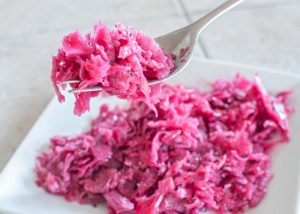
Our digestive tract, or the GI tract, is made up of every organ that we use to feed ourselves, digest, process food, and eliminate it.[10] It includes our esophagus, our stomach, our intestines, and the several organs that help us digest our food.
When our GI tract works correctly, it forms a tight barrier that controls what gets absorbed into our bloodstreams.[11] A healthy digestive tract allows only the good stuff to get into our systems and keeps out the bad stuff.
Probiotics help our gut flora to build and maintain the walls of our digestive tract. They help ensure the walls are strong enough to keep bad bacteria out and the good bacteria in. This is especially important when taking antibiotics. Antibiotics help us heal by killing off bad bacteria, but they may also harm our digestive tract.
Antibiotics work by killing bacteria.[12] However, antibiotics cannot tell the difference between bad bacteria and friendly bacteria. So, antibiotics kill ALL the bacteria, including the friendly bacteria in our system.[13] Probiotics replenish our supply of good friendly bacteria. This allows our bodies to balance our digestive tract and build up the walls inside our GI tract, even when antibiotics are at work.
Fun Fact: Did you know our entire GI tract covers 4,000 sq ft of surface area?
Probiotics stimulate immune response
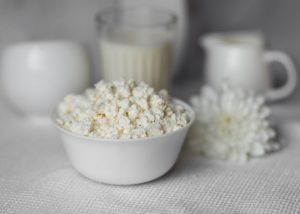
About 70-80% of our immune system is located in the GI tract.[14] Because probiotics balance our gut flora, they stimulate the immune response to help protect against infections and improve immunity.[15] Thus, the best thing you can do to maintain good health is to balance your gut flora.
One of the best ways to do that is to take a probiotic. But first, you should make sure you are getting everything you need from a probiotic supplement. So, let’s take a look at how probiotics work to help you, and then determine how to get your probiotics.
Why take probiotics?
Probiotics not only keep our gut flora balanced and help prevent sickness, but they also offer a bevy of other benefits. These benefits include helping with both long-term chronic illnesses or short-term crises, as gut flora preserves our immune system.
Furthermore, besides keeping our gut flora in balance, probiotics offer a host of other benefits.
Constipation

Do probiotics work for constipation? They sure do! Constipation is caused by a lot of different things: bad nutrition, stress, age, not drinking enough water, inactivity, and medications, just to name a few. We have just as many types of over-the-counter medications that can help, too. Some examples include laxatives, fiber-added beverages, stool softeners, enemas, and more. But nearly half of the participants in a Harvard study about taking such medications reported that they were dissatisfied with the results.[16]
In a compilation of 14 clinical trials done on the effectiveness of probiotics to relieve constipation, bifidobacterium was the most effective probiotic in relieving constipation, with most participants finding relief in 12.4 hours, and an increase the number of weekly bowel movements as well as a softening of their stool.[17]
Lactobacillus is also effective to maintain and promote intestinal regularity.[18] Both are found in cow’s milk yogurt.
Diarrhea
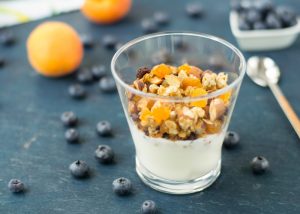
Conversely, do probiotics work for diarrhea? Naturally, because probiotics keep us balanced, they work when we have diarrhea, as well! Diarrhea is also caused by our gut flora being out-of-balance, and probiotics gently bring it back into shape.
In the case of diarrhea, the Lactobacillus and Saccharomyces strains are most effective. Yet, since all three important strains are found in cow’s milk yogurt, it can also provide probiotic support to relieve diarrhea.[19]
Yeast Infections

Yeast infections are caused by an overgrowth of candida, which is an internal yeast produced by our bodies.[20] It is caused when there are not enough friendly bacteria in our digestive tract to prevent candida from taking over and causing inflammation.[21]
Candida consumes sugar, so it is also recognizable by increased sugar cravings. Consuming sugar when there is an overgrowth of candida only serves to feed the candida and cause more overgrowth and inflammation.[22] Thus, try to find a probiotic that doesn’t have any sugar. For example, eat yogurt without sugar and sweeten it with honey or agave instead.
Probiotics keep the sugars from the candida overgrowth in check.[23] So, do probiotics work to keep yeast infections at bay if taken regularly, or at the first signs of a yeast infection? Yes! It is beneficial to start taking a probiotic supplement or up your consumption of fermented foods at the first signs of a yeast infection.
However, once a yeast infection has begun, relying on probiotics alone may not help as quickly as we would like. In fact, it may take several days or weeks for probiotics alone to cure a yeast infection. Instead, it is a good idea to know the signs of a yeast infection, or the types of issues that cause them (i.e., taking antibiotics). That way, as soon as you identify you have a yeast infection, you can take a probiotic or eat more fermented foods.
Irritable Bowel Syndrome
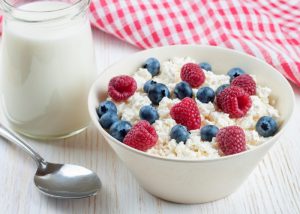
Irritable Bowel Syndrome, or IBS, consists of abdominal pain, bloating, and irregular bowel movements. IBS is usually worse after intestinal infections or antibiotics treatments. Thus, scientists have explored options for probiotics to relieve some of the pain and symptoms associated with IBS, and this is what they found.[24]
A study of 1,793 patients with IBS discovered that probiotics decrease the symptoms of alternating diarrhea and constipation, abdominal bloating and pain, distention, and flatulence associated with IBS.[25] Furthermore, the bifidobacterium strain is especially beneficial for IBS symptoms, but lactobacillus was also effective.[26] So, probiotics do work for IBS, too, and not just the occasional problematic occurrence! Good news for long-term IBS sufferers!
Urinary Tract Infections
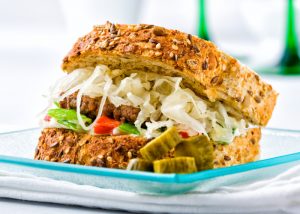
UTIs are incredibly common among women, and returning UTIs (RUTIs) are especially prevalent for people who use a long-term urinary catheter.[27] Importantly, people with RUTIs develop resistance to antibiotics, so additional or alternative medicines have begun to be explored.[28]
Probiotics are one of the most effective alternative medications against RUTIs.[29] Specifically, a probiotic regimen coupled with cranberry juice prevents the recurrence of UTIs in women.[30] According to the research, probiotics are now considered to be “the single most powerful alternative option for the prevention and treatment of chronic infections.”[31] So although probiotics do not cure a UTI, probiotics prevent them. In the end, utilizing a solid probiotic regimen can help reduce or completely prevent a UTI.
Leaky Gut Syndrome

Leaky Gut Syndrome occurs when cracks or holes appear anywhere along the lining of the digestive tract and allows partially digested food, toxins, or bugs to penetrate the tissues beneath it.[32] It can contribute to gastrointestinal conditions like Crohn’s Disease, IBS, celiac disease, and possibly other problems elsewhere in the body, like lupus, autoimmune disease, chronic fatigue syndrome, fibromyalgia, and others.[33]
A diet that preserves and stabilizes gut flora is especially beneficial to heal the pain and symptoms of Leaky Gut Syndrome.[34],[35] According to the research, one of the most important effects of probiotics is that they strengthen the lining of the digestive tract and preserve its barrier function.[36] Thus, probiotics have the power to help heal the symptoms of LGS.
Benefits of fermented foods
Probiotics are not just found in supplements, but also in fermented foods. So, what are the benefits of fermented foods? Fermented foods sit through a natural process of developing live cultures, usually by leaving them in a warm place for several days. The live cultures present in fermented foods act similar to probiotics, which mimic our own natural gut flora.[37] The cultures in fermented food colonize together to create microbial communities. In our bodies, these cultures keep our physical machine running. So, fermented foods keep our bodies in balance, just like probiotics do, through mimicking our bodies’ natural gut flora.
Furthermore, just as probiotics heal us when we are not in balance, so do fermented foods. According to the clinical trials, fermented foods are actually much more beneficial to us than just as energy. They support a healthy balance of gut flora. They preserve our immune functions. And they keep our GI tract impermeable to outside toxins or infections.
Below we have listed a few of the most accessible and enjoyable fermented foods for you to try, along with some of the excellent health benefits they offer.[38]
However, take note that most fermented foods and drinks are very sour, as that is where the colonies of live cultures live. But also keep in mind that you don’t need to eat much of it. The general rule is that a forkful of fermented food, twice a day, is optimal to keep our gut flora balanced. So, enjoy it with all of your meals.
Read more below to see how to add fermented foods to your diet regimen.
Yogurt
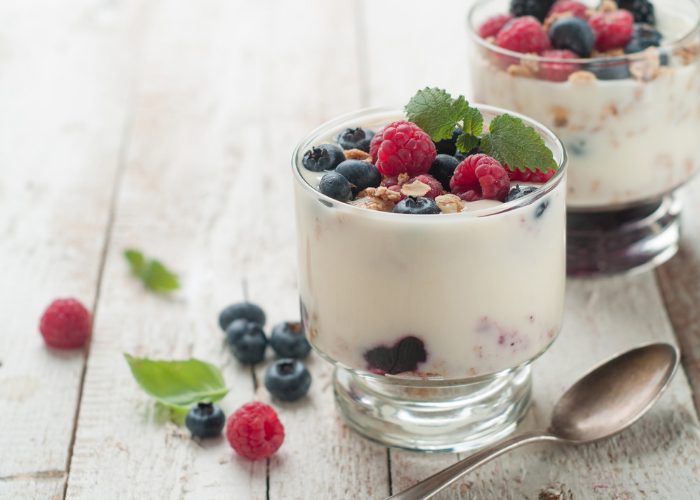
Yogurt is a food that is well-known for its probiotic qualities, and it contains all of the most important probiotic cultures available for gut flora health and balance.
Part of the reason that yogurt is such a great alternative for health and balance is that it helps us all maintain good health. All we have to do is simply eat a tasty treat to prevent problems and to alleviate irregularities.
There are many yogurts on the market that do not have a high probiotic content, so you should look for yogurts that have active cultures added. This will ensure that you get a good amount of active live cultures to help you maintain good health.
Yogurt is especially beneficial for women’s health, in particular, curing and preventing yeast infections.[39] It is also incredibly effective at preserving our digestive tract and immune system.[40]
Action steps: Add yogurt to your morning shake or eat a cup as a snack each day. You only need a spoonful or two to get those awesome benefits!
Sauerkraut
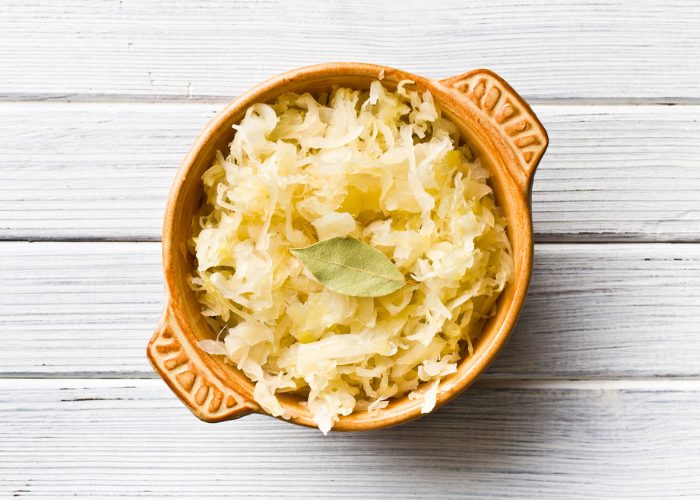
Sauerkraut is a traditional food with a long history in eastern Europe and China. Krauts contain live cultures only when they are either made fresh at home or in the refrigerated section of your grocery store. If they are canned, they have been heat-processed, so the beneficial live and active cultures don’t survive.
What makes krauts so beneficial is that they have probiotics as well as vitamins and fiber. Thus, it improves your digestion and provides vitamins and antioxidants.[41] Plus, it’s very low-calorie and fits into most modern diet plans including keto, Atkins, and Weight Watchers. It also fits perfectly in a vegan diet!
Importantly, sauerkraut is made from cabbage, which is a cruciferous vegetable. Cruciferous vegetables have antioxidants that help prevent chronic diseases.[42] And, in particular, cabbage helps protect against cancer and cardiovascular disease.[43] So you can enjoy sauerkraut for all of the benefits it provides, in addition to it being rich in probiotics!
Action steps: Add one forkful of sauerkraut to a hamburger, veggie burger, loaded French fries, or even to coleslaw or potato salad, to begin enjoying all of its probiotic benefits and fiber!
Raw cheese and whey
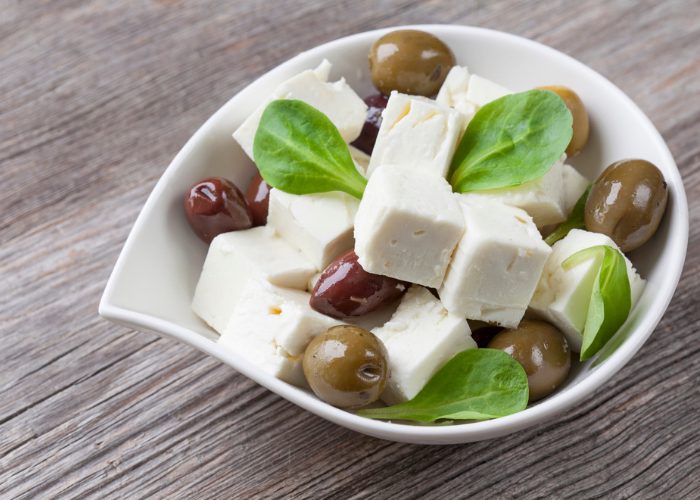
Making cheese at home is very easy, and it can retain the live, active probiotic cultures that treat your intestines so well! You need to make it with raw milk and rennet, which may not be easy to find. But if you are able to, raw cheese is a very healthy way to get your daily dose of probiotics.
An added bonus to making your own cheese is that as it ages, it releases a nutrient-packed liquid. That liquid is whey, which also has beneficial probiotics. You can use whey to make salad dressings, add it to smoothies, or drink a tablespoon a day for added health benefits.
However, if you cannot find raw milk or rennet locally, you can likely find commercial raw cheese at your grocery store. Some bries, camemberts, gruyeres, emmentalers, raclettes, and sheep’s milk roqueforts are sold raw. Ideally, they say that they are raw right on the label. Eating some of these cheeses can aid in your digestion with the help of their probiotic content.
Raw dairy has also been associated with protection against allergies and asthma.[44] Some studies show that raw milk products are edible, even by the lactose intolerant.[45] In addition, raw milk products have all of the B vitamins, as well as vitamins A, C, and E.[46]
Action steps: Crumbling a little raw bleu cheese or raw sheep’s milk feta into a salad or over a steak can help you gain the great benefits of probiotics. But remember to keep the cheese raw, and don’t cook it inside your meals, in order to retain the active live cultures!
Kimchi

Kimchi is spicy fermented cabbage which hails from Korea. You can make kimchi easily at home. You’ll need to wait for a couple of days for it to ferment – but trust us – it’s worth the wait! If you eat just one or two forkfuls per day, you can gain the benefits of its probiotic content to help keep your digestion running smoothly.
Additionally, studies on kimchi show that it affects lipid blood levels and lowers blood pressure. This helps reduce your risk of cardiovascular disease.[47] Another benefit of eating kimchi is that it helps lower cholesterol.[48] Furthermore, the more kimchi you consume, the better your cholesterol level can be![49]
Action steps: A forkful of kimchi added to fish or loaded fries can add spice and probiotic health to your meals.
Kombucha
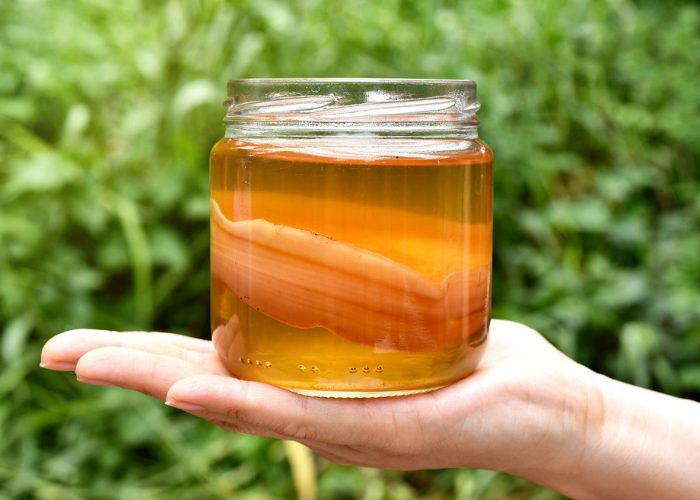
Although relatively new on the scene, kombucha is very popular, both as a homemade probiotic beverage and commercially sold in stores. Although its taste is similar to sparkling apple cider, it is actually a black/green tea made with sugar that is then fermented.
And since it is fermented, it produces beneficial bacteria for your gut. You can either make kombucha at home, or you can buy a variety of commercially sold kombucha teas that contain live, active cultures.
Kombucha tea has been extensively researched for everything from preventing cancer to helping us live longer lives.[50] Although the studies cannot fully determine that drinking kombucha will add years to our lives, its health benefits are notable. In particular, kombucha is a powerful antioxidant, as well as a probiotic, that can prevent cell deterioration and build immunity.[51]
Action steps: Sipping 4 oz. of kombucha per day can help you to digest all your meals better by imparting probiotic health in a bubbly, sweet tea.
There are many ways to include fermented foods in your daily diet. Just be creative, and remember that you don’t need much. Also, remember that you must keep it raw to get those probiotic benefits!
Where to get probiotics
Probiotics are available in supplements, in various fermented foods, or even in your own kitchen. You can easily find probiotic supplements and fermented foods at your health food store or local superstore. Here is a quick recap with some additional info about the easiest ways to get probiotics into your diet.
Supplements
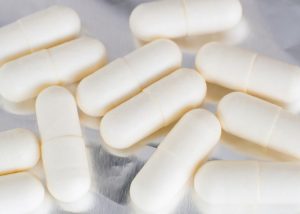
Probiotics can come in many forms: capsules, powders, tablets or liquids. Most often, they should be refrigerated. However, they may also come in a freeze-dried form for longer shelf life. Always read the label to find:
- Expiration date
- Amount of CFUs in each capsule
- Whether refrigeration is required
- Which types of probiotic strains are contained
- How many pills or doses are required per day
Store-bought fermented foods

You can also get probiotics by eating fermented foods. For example, sauerkraut, yogurt, whey, certain cheeses, kefir, kimchi, and kombucha are all fermented foods that have probiotic cultures.
Fermented foods provide a substantial amount of live active probiotics directly to your gut. Read the label to make sure that the fermented foods you buy contain live, active cultures, and make sure to check that:
- The food has not been heat-processed, like canned sauerkraut
- It doesn’t contain any alcohol, like beer or wine
- It is not fermented in vinegar, but that it creates its own probiotic brine during the fermentation process; this is usually noticeable because it adds a bubbly effect to the food that is not salty.
Homemade fermented foods

You can also make your own fermented foods at home! There are recipes for homemade kimchi, kombucha, cheese, whey, yogurt, and sauerkraut on the internet. You do not typically need a large amount every day to notice a difference in your digestion.
In the end, knowing what to look for in a probiotic supplement is very important. If you use probiotics as a supplement or as an alternative to traditional medicines for serious or chronic health conditions, consult your healthcare professional for a recommendation on the correct dosage for your needs.
4 tips on how to take probiotics
Adding probiotics into your daily diet is very easy and tasty. There is no need to be repetitive nor to require that it comes from any one single source when there are so many options available.
Use the following tips as a guideline for beginning or enhancing your probiotic regimen.
- Probiotics to preserve good health. Clinical trials often study and implement a probiotic regimen of between 10 to 20 billion CFUs (colony-forming units) for adults, and 5 to 10 billion CFUs for children.[52] It can be taken either in a supplemental form or encountered in two or three specific brand-name yogurts with very high levels of active cultures added.[53]
- Two forkfuls a day. Studies suggest that up to two forkfuls per day of fermented foods are optimum for your daily probiotic intake. Though just a single forkful each day is enough to begin balancing your intestinal flora.
- Get all three strains. When purchasing a probiotic supplement, look for one that contains all three strains to help maintain your gut flora and intestinal lining for overall better health. Fermented foods, particularly yogurt, contain all three.[54]
- Do not take expired probiotics. Since they are active live cultures, they do have a shelf life. It is best to read the label to see when each bottle expires.
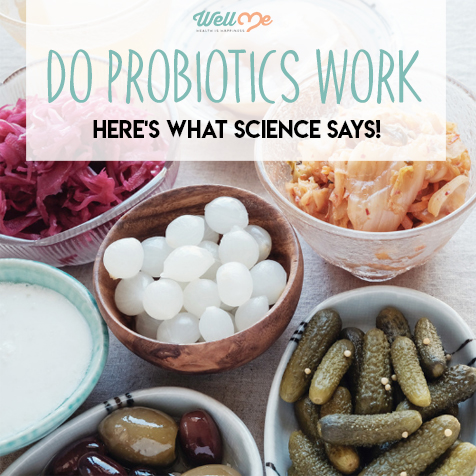
Conclusion
Finding an enjoyable route to the best health possible is really the goal of living a good life. Now that you’ve learned the answers to the questions “Do probiotics work?” “Why take probiotics?” and “What are the benefits of fermented foods?” you can start to make a habit of adding more probiotics to your diet. Hopefully, these recipes and ideas will help you find easy and credible solutions to feel better in the most flavorful ways possible. Cheers to probiotics and its friendly flora!
References
- [1] https://journals.lww.com/infectdis/Abstract/2013/09000/Probiotics__Helping_Out_the_Normal_Flora.8.aspx
- [2] https://journals.lww.com/co-gastroenterology/Abstract/2008/01000/Alterations_in_intestinal_microbial_flora_and.4.aspx
- [3] Science Mag. http://science.sciencemag.org/content/292/5519/1115
- [4] https://www.sciencedirect.com/science/article/pii/S0963996901001715
- [5] https://www.ncbi.nlm.nih.gov/pmc/articles/PMC3424311/
- [6] Scientific American. https://www.scientificamerican.com/article/do-probiotics-really-work/
- [7] https://www.gutmicrobiotaforhealth.com/en/a-battle-within-how-the-immune-system-helps-good-bacteria-fight-off-bad-microbes-in-the-gut/
- [8] University of Utah. https://learn.genetics.utah.edu/content/microbiome/antibiotics/
- [9] https://www.gutmicrobiotaforhealth.com/en/a-battle-within-how-the-immune-system-helps-good-bacteria-fight-off-bad-microbes-in-the-gut/
- [10] https://www.niddk.nih.gov/health-information/digestive-diseases/digestive-system-how-it-works
- [11] Harvard Health. https://www.health.harvard.edu/blog/leaky-gut-what-is-it-and-what-does-it-mean-for-you-2017092212451
- [12] https://learn.genetics.utah.edu/content/microbiome/antibiotics/
- [13] https://learn.genetics.utah.edu/content/microbiome/antibiotics/
- [14] NCBI. https://www.ncbi.nlm.nih.gov/pubmed/10564096
- [15] https://www.sciencedirect.com/science/article/pii/S2352385916300275
- [16] https://www.sciencedirect.com/science/article/pii/S1877886015001482
- [17] Harvard Health. https://www.health.harvard.edu/blog/probiotics-may-ease-constipation-201408217377
- [18] https://www.health.harvard.edu/blog/probiotics-may-ease-constipation-201408217377
- [19] NCBI. https://www.ncbi.nlm.nih.gov/pubmed/21992955
- [20] https://www.medicinenet.com/yeast_infection_in_women_and_men/article.htm
- [21] https://msu.edu/user/eisthen/yeast/causes.html
- [22] MSU. https://msu.edu/user/eisthen/yeast/causes.html
- [23] https://www.ncbi.nlm.nih.gov/pubmed/23361033
- [24] http://www.jnmjournal.org/journal/view.html?uid=2&vmd=Full&
- [25] NCBI. https://www.ncbi.nlm.nih.gov/pmc/articles/PMC4356930/
- [26] http://www.jnmjournal.org/journal/view.html?uid=2&vmd=Full&
- [27] https://www.ncbi.nlm.nih.gov/pmc/articles/PMC2684288/
- [28] NCBI. https://www.ncbi.nlm.nih.gov/pmc/articles/PMC2684288/
- [29] https://www.ncbi.nlm.nih.gov/pmc/articles/PMC2684288/
- [30] https://www.ncbi.nlm.nih.gov/pubmed/19441868
- [31] NCBI. https://www.ncbi.nlm.nih.gov/pmc/articles/PMC2684288/
- [32] https://www.health.harvard.edu/blog/leaky-gut-what-is-it-and-what-does-it-mean-for-you-2017092212451
- [33] https://www.health.harvard.edu/blog/leaky-gut-what-is-it-and-what-does-it-mean-for-you-2017092212451
- [34] Harvard Health. https://www.health.harvard.edu/blog/leaky-gut-what-is-it-and-what-does-it-mean-for-you-2017092212451
- [35] http://www.gaps.me/gaps-what-is-it.php
- [36] https://www.ncbi.nlm.nih.gov/pmc/articles/PMC3864899/
- [37] NCBI. https://www.ncbi.nlm.nih.gov/pubmed/27998788
- [38] https://www.ncbi.nlm.nih.gov/pubmed/27998788
- [39] https://academic.oup.com/cid/article/46/Supplement_2/S104/276784
- [40] NCBI. https://www.ncbi.nlm.nih.gov/pmc/articles/PMC5374383/
- [41] https://www.sciencedirect.com/science/article/pii/S1756464611000843
- [42] https://www.sciencedirect.com/science/article/pii/S1756464611000843
- [43] Journal of Functional Foods. https://www.sciencedirect.com/science/article/pii/S1756464611000843
- [44] https://www.ncbi.nlm.nih.gov/pubmed/27340300
- [45] https://www.ncbi.nlm.nih.gov/pubmed/27340300
- [46] NCBI. https://www.ncbi.nlm.nih.gov/pmc/articles/PMC4890836/
- [47] https://www.ncbi.nlm.nih.gov/pmc/articles/PMC3598433/
- [48] https://www.ncbi.nlm.nih.gov/pmc/articles/PMC3598433/
- [49] NCBI. https://www.ncbi.nlm.nih.gov/pmc/articles/PMC3598433/
- [50] https://onlinelibrary.wiley.com/doi/full/10.1111/1541-4337.12073
- [51] https://www.mayoclinic.org/healthy-lifestyle/consumer-health/expert-answers/kombucha-tea/faq-20058126
- [52] AAFP. https://www.aafp.org/afp/2008/1101/p1073.html
- [53] https://www.aafp.org/afp/2008/1101/p1073.html#afp20081101p1073-b1
- [54] https://www.ncbi.nlm.nih.gov/pmc/articles/PMC5312833/








